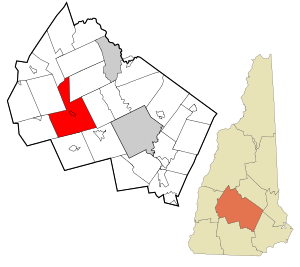Warner, NH
| Warner, New Hampshire | ||
|---|---|---|
| Town | ||

Pillsbury Free Library c. 1908
|
||
|
||
 Location in Merrimack County and the state of New Hampshire. |
||
| Coordinates: 43°16′49″N 71°48′57″W / 43.28028°N 71.81583°WCoordinates: 43°16′49″N 71°48′57″W / 43.28028°N 71.81583°W | ||
| Country | United States | |
| State | New Hampshire | |
| County | Merrimack | |
| Incorporated | 1774 | |
| Government | ||
| • Board of Selectmen | John Dabuliewicz Allan N. Brown Clyde Carson |
|
| • Town Administrator | Jim Bingham | |
| Area | ||
| • Total | 55.9 sq mi (144.8 km2) | |
| • Land | 55.6 sq mi (144.1 km2) | |
| • Water | 0.2 sq mi (0.6 km2) 0.43% | |
| Elevation | 446 ft (136 m) | |
| Population (2010) | ||
| • Total | 2,833 | |
| • Density | 51/sq mi (20/km2) | |
| Time zone | Eastern (UTC-5) | |
| • Summer (DST) | Eastern (UTC-4) | |
| ZIP code | 03278 | |
| Area code(s) | 603 | |
| FIPS code | 33-78580 | |
| GNIS feature ID | 0873745 | |
| Website | www |
|
Warner is a town in Merrimack County, New Hampshire, United States. The population was 2,833 at the 2010 census. The town is home to Northeast Catholic College, Rollins State Park and Mount Kearsarge State Forest.
The town's central settlement, where 444 people resided at the 2010 census, is defined as the Warner census-designated place (CDP), and is located along New Hampshire Route 103 and the Warner River. The town also includes the villages of Davisville and Waterloo.
The town was granted in 1735 as Number One by Massachusetts Governor Jonathan Belcher to petitioners largely from Amesbury, Massachusetts. Called New Amesbury, it was part of a line of settlements running between the Merrimack and Connecticut rivers intended to help defend Massachusetts against New France's predations. It was regranted by the Masonian Proprietors in 1749, when it was settled with four houses and a sawmill. Called Jennesstown, it was abandoned and destroyed during the French and Indian War. The town was granted again in 1767 to Jonathan Barnard and others, who called it Amesbury. But on September 3, 1774, it was incorporated as Warner, named after Jonathan Warner, a leading Portsmouth citizen, namesake of the Warner House and relative of Governor John Wentworth. It was one of the last towns established under English provincial rule prior to the Revolution.
...
Wikipedia

